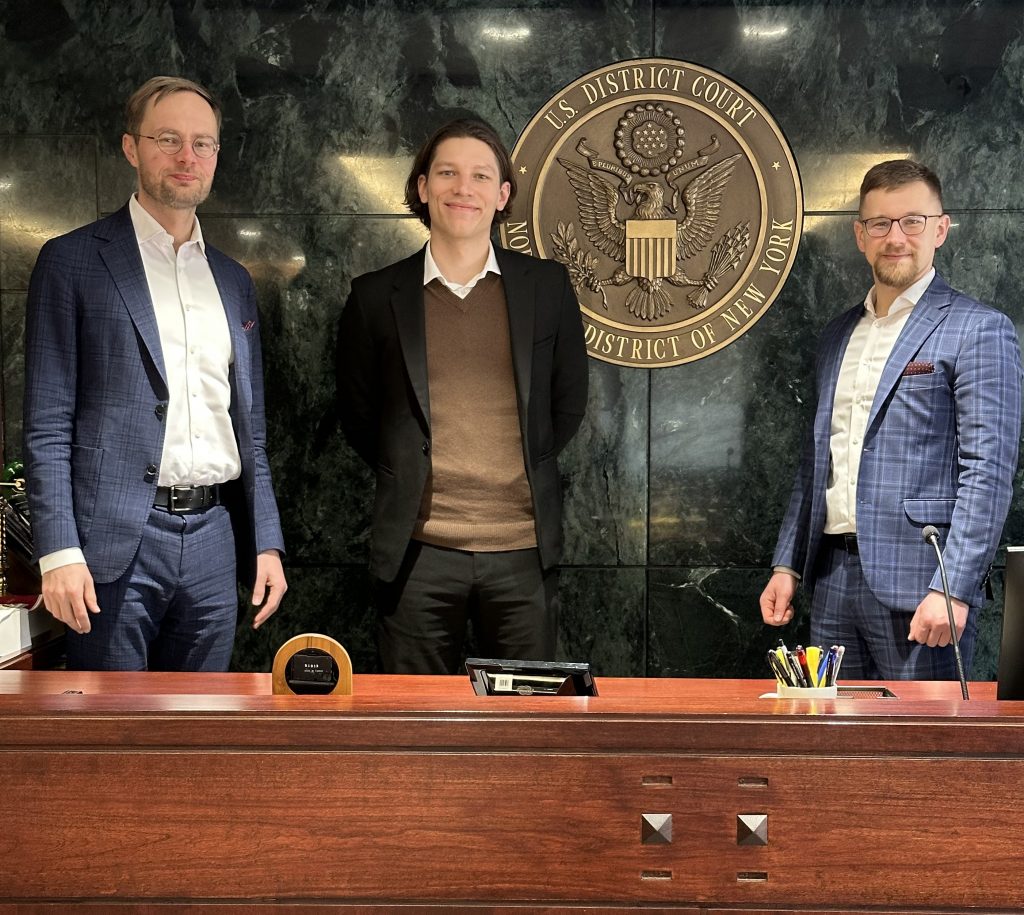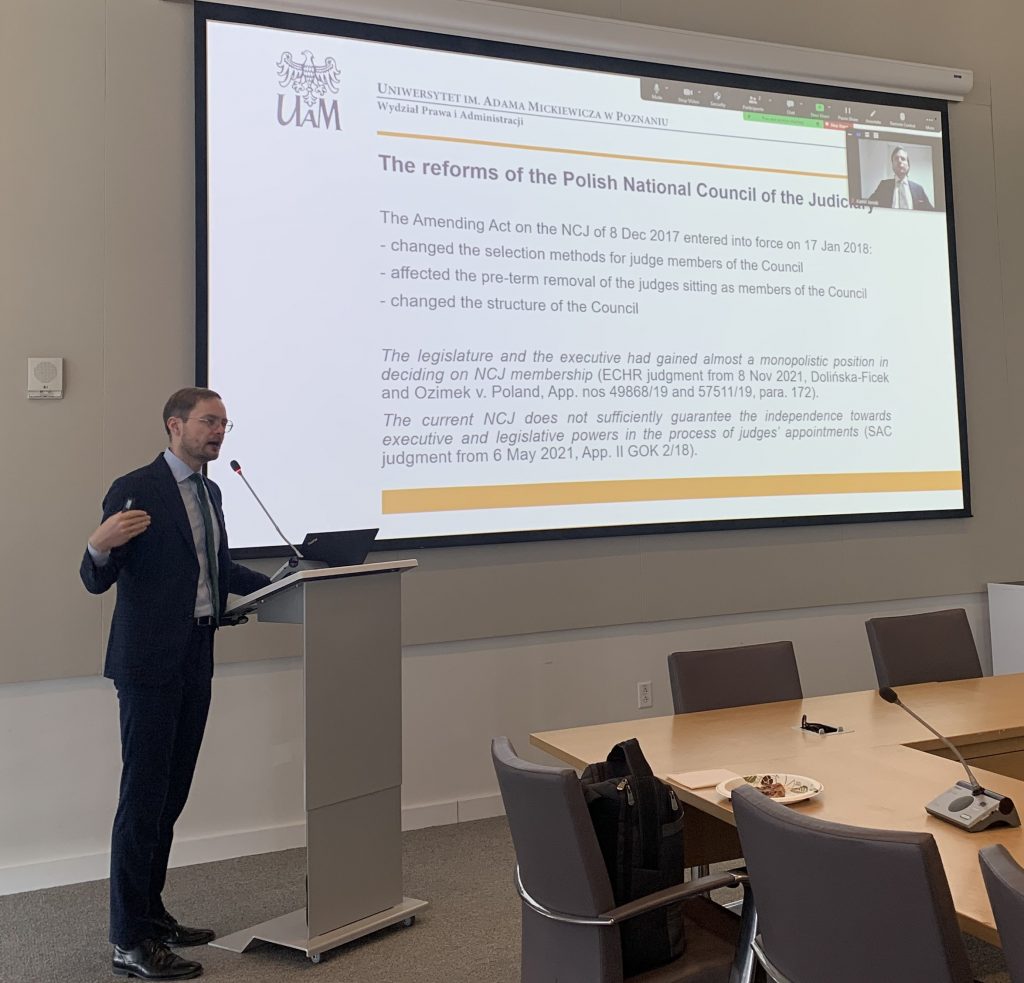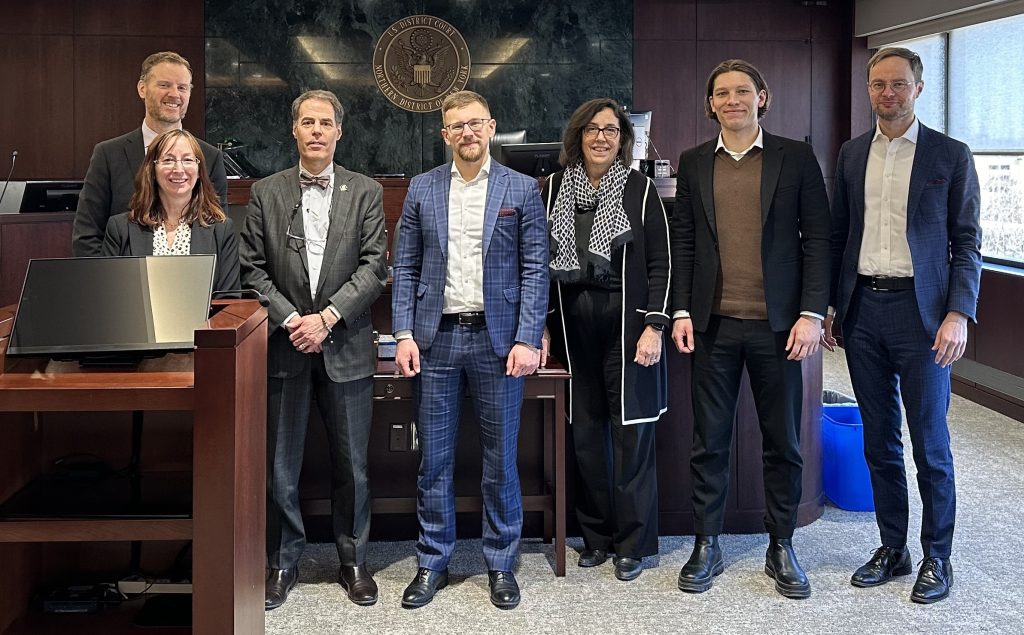The College of Law’s Memorandum of Understanding with Adam Mickiewicz University (AMU) in Poznań, Poland continues to provide opportunities for academic collaboration between the Universities. Most recently, three academics from AMU spent a few days in Syracuse between stops in Washington, DC, and New York City as part of their research trip to the United States, possible thanks to financing through the Polish National Research Centre. The visit to Syracuse was facilitated by the College of Law’s Office of International Programs.
The visitors were:
Igor Gontarz, a Ph.D. student at the Doctoral School of Social Sciences of AMU, where he is preparing a dissertation under the supervision of Professor Dr. Hab. Wojciech Piątek [1]. His scientific interests focus on the automated activity of public administration (especially towards the citizen), the issues of judicial review of algorithmic decision-making, and challenging automated activity. He is the principal investigator in the research project “Control of Automated Decision-making Systems Employed in Administrative Proceedings” and a team member on the project devoted to “Appealability of Administrative Court Judgments”.
Professor Wojciech Piątek is a professor of administrative law and procedure at AMU. He has authored more than 100 papers focused on administrative, administrative enforcement and court administrative proceedings from the European, comparative, and national (Polish) legal perspectives. He is the principal investigator in research projects devoted to supervision over courts and judges, appealability of administrative court judgments, and simplifications in administrative proceedings in Visegrad Countries.
Michał Szudrowicz is a Ph.D. student at the Doctoral School of Social Sciences at AMU, where he is preparing a dissertation under the supervision of Professor Dr. Hab. Andrzej Skoczylas, who is a Polish Supreme Administrative Court judge. His scholarly interests focus on communication between courts and society as well as the operation of the open justice principle (with particular reference to administrative courts). He is a team member on the research project “Appealability of Administrative Court Judgments”.
Their visit to the College of Law started with a tour of the Law Library where they were given information on research services they could use for their scholarship by Christine Demetros, Assistant Director for Student Learning. Then Professor Piątek attended Professor Keli Perrin’s L’04 Regulatory Law and Policy class.
“Professor Piątek gave a brief overview of how administrative law is structured in Poland. Poland is a civil law country with a Supreme Administrative Court and a Constitutional Tribunal. The United States has a common law legal system and neither of those courts. It was a wonderful comparative law discussion,” says Perrin.
Gontarz and Szudrowicz presented on their dissertation topics to a group of College of Law students and faculty. Later, the group was hosted by the Hon. Thérèse Wiley Dancks L’91, United States Magistrate Judge for the Northern District of New York, for an informal discussion about the federal court system and the court system in Poland.
The visitors finished the day by attending Professor Brian Gerling’s L’99 Technology Law and Innovation Practice class.
Their second day began with a meeting with University Professor David Driesen, who visited AMU to research Poland’s democratic decline for his book, “The Specter of Dictatorship: Judicial Enabling of Presidential Power.”
“Since my visit, the opposition to the autocratic Law and Justice Party has taken control of the Parliament, so I was eager to learn more about how the process of restoring democracy was going. I learned a lot about that in speaking with Professor Piątek and his students. And I was pleased to be able to share some details about our administrative law system relevant to their research,” says Driesen.
The formal part of their visit concluded with Professor Piątek delivering a lecture together with Dr. Kamil Joński, from SGH Warsaw School of Economics to the College of Law faculty on “New” versus “Old” judges in the Polish Supreme Administrative Court – is it important which judge adjudicates your case?
An important part of the visit to the College of Law was the opportunity for the visitors to casually meet and interact with ISPL students during breaks by using the Institute for Security Policy and Law (ISPL) as a workspace, kindly provided by ISPL Director the Hon. Jamie Baker.
“You might not think there would be a lot of crossovers between administrative law professors and students and national security, but we had a lot of discussions pertinent to the rule of law and democracy,” says Faculty Fellow Maria Cudowska. ““One of the reasons why ISPL is a great hub for international visitors are the people who work here. Our research assistants are an invaluable asset of the College of Law community, they are deeply invested in creating a collegial and collaborative environment.”
Because their visit was so short, it would be hard to make connections and rapport with College of Law students and faculty if not for the ISPL.
“I have to give credit to the ISPL research assistants who went above and beyond in making our visitors feel welcome. The Ph.D. students are about the same age as the law students so that made a difference for both sides in establishing relationships,” says Cudowska.
The AMU visitors found their brief stay in Syracuse very beneficial to their scholarship and created lasting connections with faculty and students.
“The aim of our stay was exclusively scholarly. Our goal was focused on presenting our research whilst learning from our American counterparts by attending classes and performing library research on the system of appealing administrative decisions of administrative bodies (agencies) to the American courts (both at federal and state levels) as well as how the judiciary and public administration are open to citizens’ needs (mainly at the courts level – the idea of open justice) and to what extend they are digitalized (mainly at the public administration level in issuing and controlling of automated decisions.)
In reality, we received much more information than we expected. The consultations with Professors Driesen and Perrin gave us a deep view of the American administrative procedure and judiciary. The discussions had both a theoretical and a practical perspective. We got to learn many details that are not easily accessible in books. The same impression is connected with the presentations that we gave to professors and students.
In addition, research done in the library was entirely useful. We had an opportunity to go through electronic and manual sources and collected a broad array of materials and documents that now are a remarkable point for studying American administrative procedural law.
The social component of our short stay in Syracuse is worth stressing. We met many friendly scholars who offered us their time and company coffee in the Institute for Security Policy and Law as well as caps and scarfs from the Syracuse University store that were useful during the freezing Syracuse days.
Undoubtedly, we will keep in mind all our experiences from Syracuse with a hope for a comeback!” said the visitors from AMU.
[1] Habilitated doctor (Eng.), doktor habilitowany (PL). An academic degree awarded to a person who holds a doctoral degree; has scientific or artistic achievements, which constitute a significant contribution to the development of a specific discipline, Act of 20 July 2018, the Law on Higher Education and Science
Place of publication: (Dz. U. z 2023 r. poz. 742, z późn. zm.)



